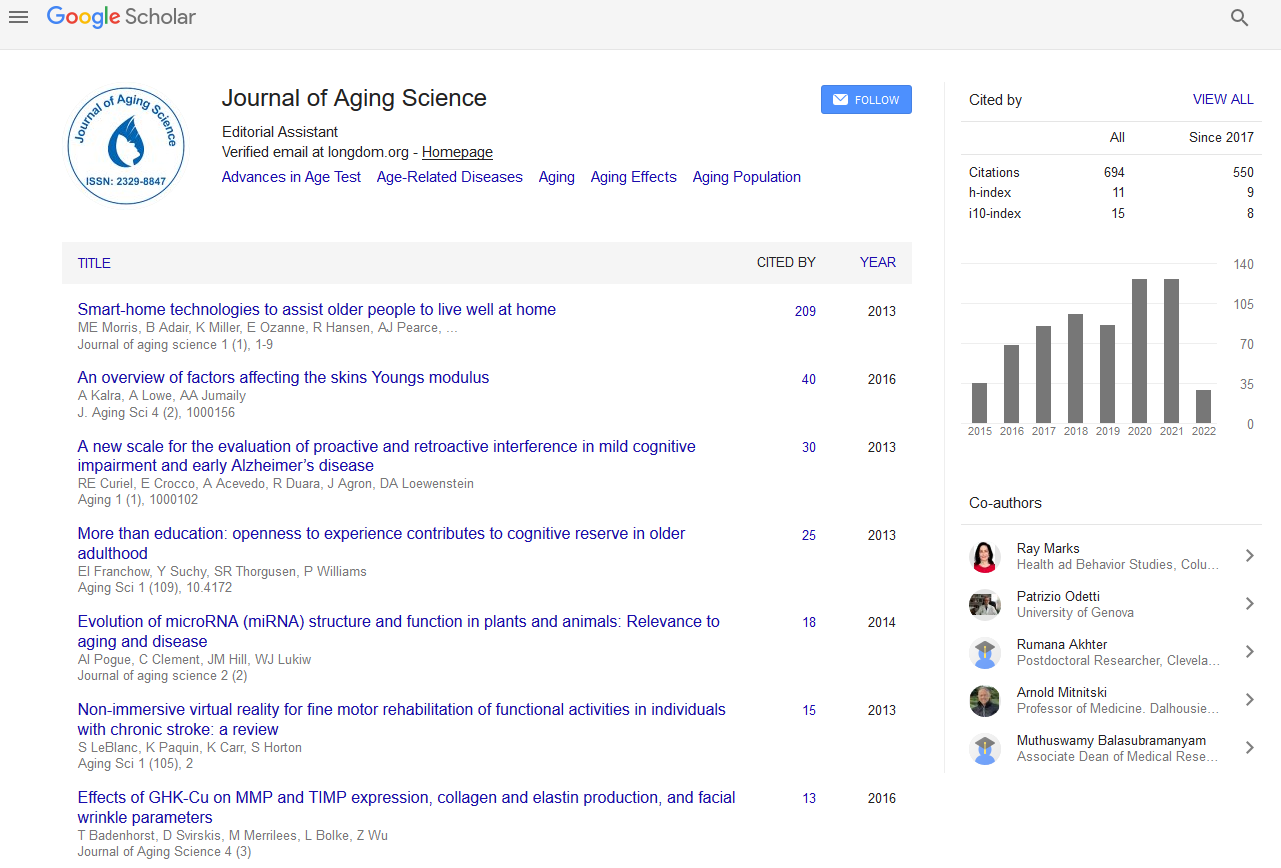PMC/PubMed Indexed Articles
Indexed In
- Open J Gate
- Academic Keys
- JournalTOCs
- ResearchBible
- RefSeek
- Hamdard University
- EBSCO A-Z
- OCLC- WorldCat
- Publons
- Geneva Foundation for Medical Education and Research
- Euro Pub
- Google Scholar
Useful Links
Share This Page
Journal Flyer

Open Access Journals
- Agri and Aquaculture
- Biochemistry
- Bioinformatics & Systems Biology
- Business & Management
- Chemistry
- Clinical Sciences
- Engineering
- Food & Nutrition
- General Science
- Genetics & Molecular Biology
- Immunology & Microbiology
- Medical Sciences
- Neuroscience & Psychology
- Nursing & Health Care
- Pharmaceutical Sciences
Commentary - (2021) Volume 0, Issue 0
Aging Effects on Memories and Thoughts
Sindhuja I*Received: 20-Sep-2021 Published: 11-Oct-2021, DOI: 10.35248/2329-8847.21.s7.002
Description
Aging principally affects personal memory, namely memory for specific events or experiences that occurred within the past. Although many older adults believe that their memories for remote events are better than their memories for recent events, it's likely that older memories became more semantic or like retaining the general core information but lacking details, particularly temporal context. These older memories have been often joined the realm of things that we now know. More problematic for older adults are remembering context or source information: where or when something was heard or read or even whether something actually happened or was just thought about, what has been called reality monitoring. Encoding and retrieval of these kinds of specific or peripheral details about a prior event may be particularly demanding of attention resources and good cues for the retrieval of such information may often be lacking. Although long-term memory is essentially preserved in adulthood, the very fact that what's retrieved from long-term memory is public knowledge not specific detail, may contribute to the absence of age differences. The exception to this type of pattern might be the retrieval of a person’s name or a specific word for a specific context, both of which show deficits in normal aging. The specificity of the information may therefore be a critical determinant of age differences. There is some suggestion that age related deficits in memory could also be reduced for emotionally arousing events or materials then emotional or personal investment in an experience may be a crucial variable in personal memory in older adults. High levels of emotion or stress however generally have negative effects on memory. Evidence indicates that perceptual function is reduced in older adults and isn't always correctable by external aids. This suggests at the very least that researchers should pay careful attention to and control for sensory and perceptual deficits when conducting cognitive experiments. Evidence from a range of large scale aging studies has demonstrated that a significant proportion of the age related variance in several cognitive tasks can be accounted by hearing and vision loss which once these sensory differences are statistically controlled; there are not any longer age differences in cognitive functioning. Declining sensory and perceptual abilities have important implications for the everyday lives of older adults. Hearing loss can isolate older people preventing them from engaging in conversation and other social interactions. Visual impairments can limit mobility and interact with attention deficits to make driving a particularly hazardous activity. As older people develop strategies to compensate for declining sensory activity. As older people develop strategies to compensate for declining sensory abilities, the ways in which they perform other cognitive tasks may help the adjustment and improve performance. Speech and language processing are largely intact in older adults under normal conditions although time interval could also be somewhat slower than in young adults. Infact, there is evidence that discourse skills actually improve with age. Older people often tell wellstructured elaborate narratives that are judged by others to be more interesting.
Citation: Sindhuja I (2021) Aging Effects on Memories and Thoughts. J Aging Sci. S7: 002.
Copyright: © 2021 Sindhuja I. This is an open-access article distributed under the terms of the Creative Commons Attribution License, which permits unrestricted use, distribution, and reproduction in any medium, provided the original author and source are credited.


